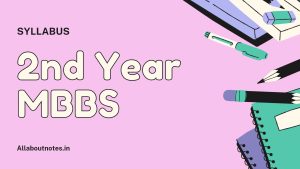MBBS second year is an important phase in the medical journey. After completing the basics in first year (Anatomy, Physiology, Biochemistry), the second year introduces students to subjects that connect the foundation sciences with clinical medicine. This guide explains the MBBS 2nd year syllabus as per NMC (National Medical Commission) guidelines, the subjects included, recommended Indian author books, and tips to study effectively.

Overview of MBBS Second Year
- Duration: 1.5 years (3rd to 5th semester)
- Subjects Covered: Pathology, Pharmacology, Microbiology, Forensic Medicine
- Additional Exposure: Introduction to clinical postings in Medicine, Surgery, Pediatrics, and other departments
- Exams: Internal assessments, practicals, viva, and university finals
MBBS Second Year Subjects in Detail
Pathology
Pathology is the study of diseases – their causes, mechanisms, and effects on the body. It forms the bridge between basic sciences and clinical subjects.
Syllabus includes:
- General Pathology – Cell injury, inflammation, healing, immunity, neoplasia
- Systemic Pathology – Cardiovascular, Respiratory, Gastrointestinal, Liver, Kidney, Endocrine, etc.
- Hematology – Anemias, Leukemias, Lymphomas
- Clinical Pathology – Urine analysis, Body fluids
Recommended Indian Books for Pathology:
- Harsh Mohan’s Textbook of Pathology
- Ramadas Nayak’s Pathology Made Easy
- Harsh Mohan’s Practical Pathology
Pharmacology
Pharmacology is the study of drugs, their actions, and their uses in treatment. It is highly relevant for clinical practice.
Syllabus includes:
- General Pharmacology – Absorption, distribution, metabolism, excretion
- Autonomic Nervous System drugs
- Cardiovascular Pharmacology
- Central Nervous System drugs
- Antimicrobials
- Endocrine Pharmacology
- Chemotherapy
- Clinical Pharmacology
Recommended Indian Books for Pharmacology:
- K.D. Tripathi’s Essentials of Medical Pharmacology
- Satoskar’s Pharmacology and Pharmacotherapeutics
- R.S. Satoskar’s Clinical Pharmacology
Microbiology
Microbiology deals with microorganisms, infections, and immunity. It is essential for understanding infectious diseases and their management.
Syllabus includes:
- Bacteriology – Classification, Gram positive and Gram negative bacteria
- Virology – DNA and RNA viruses
- Mycology – Fungal infections
- Parasitology – Protozoa and Helminths
- Immunology – Antigens, Antibodies, Hypersensitivity
- Applied Microbiology – Sterilization, Antibiotic resistance
Recommended Indian Books for Microbiology:
- R. Ananthanarayan & C.K. Jayaram Paniker’s Textbook of Microbiology
- Apurba Sastry’s Essentials of Microbiology
- Arora & Arora’s Textbook of Microbiology
Forensic Medicine
Forensic Medicine (FMT) deals with the application of medical knowledge in legal and criminal cases. It is very scoring and clinically relevant.
Syllabus includes:
- Medical Jurisprudence – Legal responsibilities of doctors, consent, negligence
- Forensic Pathology – Death, postmortem changes, injuries
- Toxicology – Poisons, alcohol, drug abuse
- Forensic Psychiatry
- Medical Ethics
Recommended Indian Books for Forensic Medicine:
- Reddy’s Essentials of Forensic Medicine and Toxicology
- Anil Aggrawal’s Forensic Medicine and Toxicology
- Mathiharan & Patnaik’s Medical Jurisprudence and Toxicology
Summary Table – MBBS 2nd Year Subjects and Books
| Subject | Main Topics Covered | Recommended Indian Books |
|---|---|---|
| Pathology | General, Systemic, Hematology, Clinical Pathology | Harsh Mohan, Ramadas Nayak |
| Pharmacology | General, Autonomic, CVS, CNS, Antimicrobials, Chemotherapy | K.D. Tripathi, Satoskar |
| Microbiology | Bacteriology, Virology, Mycology, Parasitology, Immunology | Ananthanarayan, Apurba Sastry |
| Forensic Medicine | Medical Jurisprudence, Toxicology, Forensic Pathology, Ethics | Reddy, Anil Aggrawal |
How Tough is MBBS Second Year?
The workload in second year is different from the first year. The syllabus is more clinically relevant but spread across four subjects. Pathology and Pharmacology require continuous study, while Microbiology and Forensic Medicine are more memory-based.
- Pathology: Concept-heavy and core for all clinical subjects
- Pharmacology: Needs regular revision of drug names and mechanisms
- Microbiology: Requires memorization of organisms and lab tests
- Forensic Medicine: Short subject, high scoring with proper notes
Study Tips for Second Year MBBS
- Revise pathology topics weekly, especially hematology and systemic pathology
- Make charts and mnemonics for pharmacology drugs
- Use tables and flowcharts for microbiology classification
- Prepare FMT short notes from the start – very useful for exams
- Attend clinical postings seriously, as they build basics for final years
Suggested Study Plan
- Daily: 2 hours Pathology, 1.5 hours Pharmacology, 1 hour Microbiology, 30 mins Forensic Medicine
- Weekend: Revise practical records, slides, and toxicology charts
- Before Exams: Practice previous year question papers and important topics
Key Takeaways
- MBBS Second Year includes Pathology, Pharmacology, Microbiology, and Forensic Medicine
- Choose standard Indian author textbooks for clarity and easy understanding
- Balance between concept-heavy subjects (Pathology, Pharmacology) and memory-based ones (Micro, FMT)
- Regular revision and integration with clinical postings are crucial
Final Words
MBBS second year is where medical students start connecting theory with clinical practice. It may seem challenging at first, but with systematic study and the right books, you can master it. Focus on building strong basics in Pathology and Pharmacology, while revising Microbiology and Forensic Medicine regularly. This year sets the stage for your final clinical years, so study consistently and stay disciplined.
